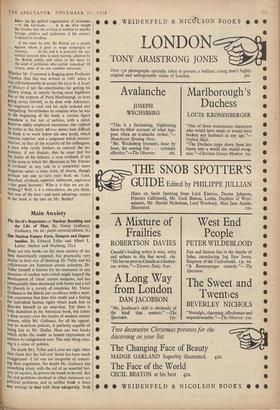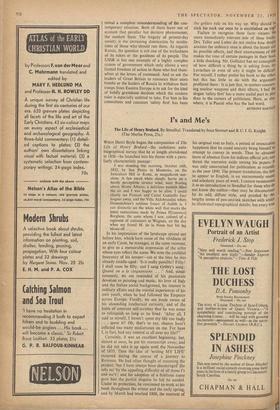Main Anxiety
the Devil's Repertoire or Nuclear Bombing and the Life of Man. By Victor Gollancz. (Gollancz, 10s. od.; paper-covered edition, 5s.) Our Nuclear Future: Facts, Dangers and Oppor- tunities. By Edward Teller and Albert L. Latter. (Seeker and Warburg, 21s.) HERE are two books on the main anxiety of our time theoretically opposed, but practically very similar in their way of thinking. Dr. Teller and his collaborator are American atomic scientists. Dr. Teller himself is known for his resistance to any cessation of nuclear tests which might imperil the development of 'clean' atomic weapons, and has consequently been decorated with horns and a tail by liberals in a variety of countries. Mr. Victor Gollancz is the liberal par excellence with a sensi- tive conscience that does him credit and a feeling for individual human rights which leads him to describe himself as an anarchist. Yet there is little diabolism in the American book, but rather a deep anxiety over the results of modern atomic science, while Mr. Gollancz, for all his opposi- tion to Amdrican policies, is perfectly capable of being fair to Mr. Dulles. Here are two books Which strike the reader as honest expressions of opinion by enlightened men. The only thing miss- ing is a sense of politics.
No doubt Drs. Teller and Latter are right when they claim that the fall-out' threat has been much exaggerated—I for one am incapable of contest- ing their arguments. No doubt Mr. Gollancz has something when, with the aid of an assorted bat- tery of mystics, he proves the bomb to be evil. But the real problems involved in either statement are Political problems, and in neither book is there hay attempt to deal with these adequately. Both reveal a complete misunderstanding of the con- temporary situation. Both of them leave out of account that peculiar but decisive phenomenon, the modern State. The tragedy of present-day society is the increasing domination by institu- tions of those who should run them. As regards Russia, the question is not one of the wickedness of its rulers or the goodness of its people. The USSR is but one example of a highly complex system of government which only allows a very limited freedom of action to those who find them- selves at the levers of command. And to ask the leaders of Great Britain to renounce their atom bombs or the leaders of Russia to withdraw their troops from Eastern Europe is to ask for the kind of boldly gratuitous decision which the modern ruler is especially unfitted to take. For him in his committees and caucuses 'safety first' has been the golden rule on his way up. Why should he stick his neck out once he is established on top?
Failure to recognise these facts vitiates the more immediately relevant side of these books' Drs. Teller and Latter do not realise how deeply anxious the ordinary man is about the bomb and its possible effects, and their unawareness of this makes the tone of certain passages in their boot, a little shocking. Mr. Gollancz has no conception of how difficult a thing he is asking from the Leviathan or even of why it might be difficult' For myself, I rather prefer his book to the other. but this has little to do with the arguments proffered there: It is just that, in matters concern- ing nuclear weapons and their effects, I feel the slogan 'safety first' has a more useful part to play than in the careers of politicians. Here, as else- where, it is Pascal who has the last word.
ANTHONY HARTLEY















































































 Previous page
Previous page